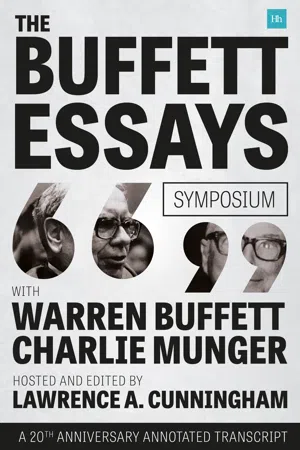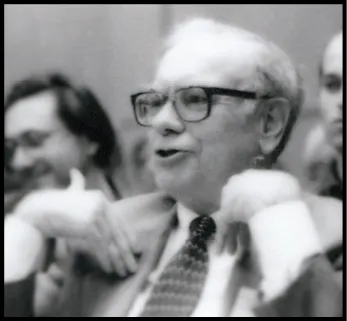Accounting and Taxation
Cal Johnson, Ed Kitch, Lou Lowenstein, Elliott Weiss, Jim Repetti
* * * * *
Elliott Weiss discussed the accessibility of The Buffett Essays, especially for students learning accounting and valuation, including to develop an understanding of the limits and malleability of these tools.
BUFFETT: What bothers me, in addition to everything that has just been enumerated, is that I see the auditors encouraging it. And I say to myself: There are only six of you who have to get together and agree we’re not going to play around this way and there will be a stigma attached to anyone that has a certificate from anyone but those six. So it doesn’t require some huge brave act of the auditing profession to get better financial reporting. But it doesn’t happen and in effect they become conspirators.
There is no question the leeway I have to report earnings as CEO of Berkshire is enormous. I don’t know how to quantify it precisely, and some of it would catch up with you later on, in terms of insurance reserves, for example. In an insurance company, the long-tail business in particular, you can paint any picture you want, for a period that probably encompasses enough time to either buy out the public or to effect a major public offering.
SIMPSON: On the question of pooling and protecting pooling by satisfying the technical requirements—the implication to me is that companies think the market is stupid and they really don’t look at real economics, but only the purely cosmetic accounting of it. Maybe this is naive, but I think the market does, over some period of time, look at real economic earnings and that companies are fooling themselves if they think that they can do all these cosmetic accounting things and have the market believe it. Am I naive?
MUNGER: I can answer that in part, sharing my love of biology and psychology. They’ve done very interesting experiments with monkeys in zoos. They create a system where the monkey can do things to get a token and the token can immediately be exchanged for a banana. The monkey soon learns to work just as hard for a token as he formerly did for a banana. You can hardly think that corporate managements are going to be much better (laughter).
BUFFETT: In certain kinds of markets—including in the late 1960s for sure and maybe some more recently—there is a feeling among people who are either very smart or cynical that they would rather buy into manipulated earnings than real earnings because there is more certainty of manipulated earnings coming through on target for some time and they will get out before it all collapses. I saw that first hand in the sixties. There are people who think it is rational to play along with a game that isn’t going to be discovered until they are out of it. I would say that I agree with Lou [Simpson] practically all the time, but a lot of money can change hands during the period of manipulation before it eventually tarnishes the reputation of the National Student Marketings of the world.
LOU LOWENSTEIN: Arthur Wyatt, a very distinguished accountant at Arthur Andersen, reported some years ago on off-balance sheet financing. At Supermarkets General, we paid hard cash to push financing off the balance sheet—before I became President. It’s endemic. The debt is there but we don’t want it on the balance sheet. There was a study that he reported on: 40% of the securities analysts—and maybe more importantly of loan officers—missed the off-balance sheet financing. If you can fool 40% of the people all the time, that’s not bad.
At GE, Jack Welch is ever devoted to increasing earnings-per-share. One year, earnings were really down except for an adjustment to the assumptions under the pension plan and the liquidation of a LIFO reserve which very conveniently produced up earnings instead of down earnings. Of nine securities analyst reports, only one noted that fact. Eight of nine is not bad. Jack was a winner on that one.
The earnings-per-share experience of the 1960s was—and Ben Graham used to write on this—that if you issued convertible preferreds and warrants nobody paid any attention until they were exercised. That was stupid, but those were the numbers that everybody was looking at it. In a rational world that would not happen, but in the real world—guys want to go out to have lunch, they want to chase girls, go to baseball games—it’s an imperfect world, as Lou well knows.
WEISS: Picking up on Warren’s comment, particularly about the insurance business, it strikes me that—I’m not a financial analyst and I’m not formally trained in any of these areas—but it seems to me as an observer of businesses that virtually every corporation has within its financials one or more accounts that are highly judgmental in nature. In the case of insurance it is fairly easy to identify this—how do you estimate your loss reserves. Or dealing with inventory in a retailing business. This is one of the issues that the accounting system has to deal with.
This takes us back in a different way to one of the themes of discussion over the past couple of days: How much confidence do you have in the integrity of the people who are putting out the numbers? They have to make judgments of some kind. There is no number that one can find that is the objectively right number of what your loss reserves are in your reinsurance business. There’s a range of reasonableness there. It ultimately comes down to the question of trust and integrity of the managers making those estimates.
BUFFETT: What bothers me, Elliott, is that people of generally high integrity who you would trust in any situation—you could make them the trustee under your will—but it has now become the norm to feel that as a manager of a major company it is up to you to play the accounting game, particularly the ones suggested to you by your very auditor.
For example, what’s happened with restructuring, what’s happened with purchase accounting adjustments? I have seen significant cases where the auditors come to management and say, here is the way to do this at this point so that you can report better numbers later on. And nobody will pay attention to the numbers for this period because of this or that going on.
It is the degree to which the high grade people have either been co-opted, or acquiesced or whatever word you want to pick. And that’s very tough to cleanse the system of because you don’t have good guys and bad guys anymore. Six firms could get together and do it.
Current Commentary
“The auditing profession would have done well to heed Buffett’s hopeful prescriptions. Instead, as this exchange occurred in 1996, accounting frauds were underway at Enron, Global Crossing, Qwest, and WorldCom. Within a few years, when these and others were exposed, Arthur Andersen collapsed, the Sarbanes-Oxley Act restructured the auditing function, audit committees wielded newfound power over auditors, and the Public Company Accounting Oversight Board was created.”
–Larry Cunningham
* * * * *
Calvin Johnson postulated that financial accounting standards are indispensable to properly functioning capital markets and stressed that the entire discipline should be dedicated to the interests of investors. While saying Buffett is usually on the side of accounting for investors, Johnson criticized Buffett’s accounting for Berkshire’s acquisition of Scott Fetzer as a pooling and how Berkshire accounted for inventory of World Book encyclopedias.
LOWENSTEIN: I was quite prepared to come to Warren’s defense on t...



